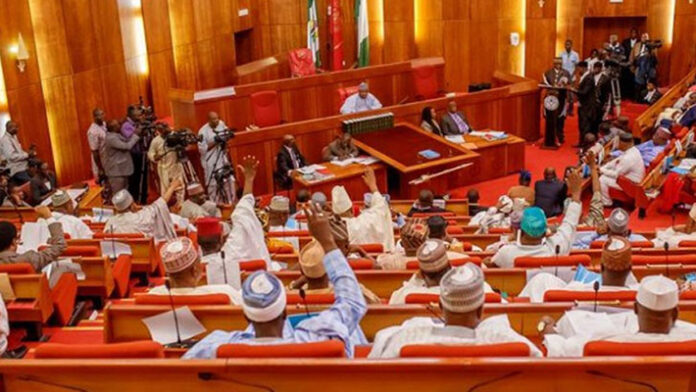Senate criticises governors’ new push for LG allocations
On Wednesday, the Senate expressed its support for the Supreme Court’s July 11, 2024, ruling that granted financial autonomy to the 774 Local Government Areas across the country.
The Senate criticized recent efforts by some governors to enact laws requiring local government councils in their states to deposit allocations into a joint account.
This follows the Anambra State House of Assembly’s passage of the Local Government Administration Bill 2024 on Tuesday, which has faced backlash from civil society groups and opposition parties, including Labour Party lawmakers. They claim the bill is an attempt by Governor Chukwuma Soludo to pressure council chairmen into redirecting their federal allocations back to the state.
Reports suggest that several other state houses of assembly have also passed bills related to local government administration.
During Wednesday’s plenary, the Senate urged all three tiers of government to fully comply with the Supreme Court judgment and resolved to work with the House of Representatives to amend certain provisions of the 1999 Constitution for full implementation.
READ ALSO: Senate postpones public hearing on alleged economic sabotage in oil sector
These resolutions followed motions sponsored by Deputy President of the Senate Jibrin Barau and seconded by Abdul Ningi and Tahir Monguno.
Barau said, “I stand to move on behalf of this Senate for the approval of two prayers in respect of the motion that was brought by Tony Nwoye (Anambra North), thereby discarding the earlier prayers in the motion as sponsored by the mover.
“The two prayers are as follows: all states and local governments must fully comply with the recent Supreme Court judgment on the disbursement of and utilisation of funds accruing to all local governments in Nigeria.
“That the Senate ensures alterations to the relevant provisions of the constitution to provide for the full autonomy of the local governments in Nigeria.”
However, the resolutions came two hours after the Senate encountered challenges regarding the enforceability of the Supreme Court judgment at the state and local government levels.
At the beginning of the plenary, Nwoye (LP, Anambra North) invoked Senate Standing Orders 41 and 51 to address alleged attempts by some state governments to circumvent the judgment by passing counter-laws through their respective Houses of Assembly.
Nwoye, who noted that nine other senators co-sponsored the motion, specifically claimed that some governors were enacting laws requiring local government councils in their states to deposit funds into the State/Local Government Joint Account, a practice ruled against by the Supreme Court.
Following Nwoye’s presentation, which included six prayers for enforcing the judgment and was seconded by Osita Izunaso (APC, Imo West), Adamu Aliero (PDP, Kebbi Central) raised a constitutional point of order to halt the debate on the motion.
Citing Section 287 of the 1999 Constitution, which makes Supreme Court judgments enforceable nationwide, Aliero urged the Senate not to “over-flog” the issue.
He said, “The Supreme Court judgement is enforceable across the country. There is no need for us to debate anything that has to do with it here.”
In agreement with Aliero, the Senate President, Godswill Akpabio, highlighted Section 162, Subsection 6 of the 1999 Constitution, which created the State/Local Government Joint Account.
He noted that the provision must be amended to allow for the full implementation of the Supreme Court judgment.
Before a final decision could be made on the motion, Nwoye invoked Order 42 of the Senate Standing Rules for a personal explanation.
Abdulrahman Kawu Summaila (NNPP, Kano South) raised a similar point of order.
The simultaneous motions led to confusion, prompting many senators to consult with the Senate President, resulting in an emergency closed-door session at 12:46 pm.
However, the resolutions came two hours after the Senate encountered challenges regarding the enforceability of the Supreme Court judgment at the state and local government levels.
At the beginning of the plenary, Nwoye (LP, Anambra North) invoked Senate Standing Orders 41 and 51 to address alleged attempts by some state governments to circumvent the judgment by passing counter-laws through their respective Houses of Assembly.
Nwoye, who noted that nine other senators co-sponsored the motion, specifically claimed that some governors were enacting laws requiring local government councils in their states to deposit funds into the State/Local Government Joint Account, a practice ruled against by the Supreme Court.
Following Nwoye’s presentation, which included six prayers for enforcing the judgment and was seconded by Osita Izunaso (APC, Imo West), Adamu Aliero (PDP, Kebbi Central) raised a constitutional point of order to halt the debate on the motion.
“Recently, Anambra State Local Government Administration Bill was brought to the Assembly.
“Some sections of the bill, particularly sections 13, 14 and 16 seek to compel the Local Governments to pay their federal allocation into an account to be established by the state government, thereby running foul of the Supreme Court judgment.
“Consequently, we as the Labour Party caucus in the state House of Assembly wish to state as follows: That we stand by the decision of the Supreme Court, the highest court in the land, on the autonomy of the Local Government and the management of their funds.
“That going by the extant order of the Supreme Court, the state House of Assembly cannot make laws seeking to compel the local governments to pay in their federal allocation to the state government under whatever guise.
“We, therefore, stand with the overwhelming majority of Anambra people in upholding the constitution and the Supreme Court decision.”
Reacting, the Executive Director of Civil Rights and Liberty Organisation, Dr Ralph Uche, described the bill as “anti-people” aimed at denying the Local Government the funds meant for grassroots development.
Uche, a lawyer, said, “The bill seeks to compel local government areas to remit a portion of their federal allocations into a consolidated account controlled by the state, which is a wrong development, considering that the local government areas have suffered lack of dividends of democracy in the last 10 years.”
Follow the Neptune Prime channel on WhatsApp:
Do you have breaking news, interview request, opinion, suggestion, or want your event covered? Email us at neptuneprime2233@gmail.com





